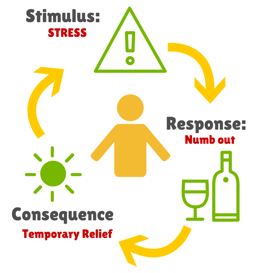 Have you or your loved one continued to struggle with addiction even after trying 12-Step or other recovery programs?
Have you or your loved one continued to struggle with addiction even after trying 12-Step or other recovery programs?
If so, consider the possibility that there may be related underlying issue fueling the addictive behavior which has not been addressed.
What is Dual Diagnosis?
Simply put, dual diagnosis is a technical term for co-occurring disorders that occur within one individual, one of which is an addiction.
A person dealing with substance addiction as well as another diagnosis, such as Post-Traumatic Stress Disorder (PTSD), anxiety, or Obsessive-Compulsive Disorder (OCD), has by definition, a dual diagnosis. And if that’s the case, the addiction treatment program must encompass both diagnoses in order to be effective.
Fortunately, help is available. As you seek out a dual diagnosis treatment center, make an informed choice by keeping these four questions in mind.
1. Does the dual diagnosis treatment center treat addiction and mental health issues separately or holistically?
Many recovery programs don’t produce lasting change because they fail to address the mental and emotional conditions that contribute to addiction. They focus on treating substance abuse without digging deep enough into the root causes of the why someone is using.
And what happens when you pull up weeds but leave the roots? That’s right: They grow back.
“[People with dual diagnosis] are not abusing substances just because it's fun," said Joe Koelzer, co-founder and CEO of The Clearing. "They're abusing substances to medicate themselves away from the intense negative feelings that they've got. [They]'re using the substances to get away from depression and anxiety and self-loathing and hopelessness …”
In other words, the mental health diagnosis and the substance addiction aren’t separate, but intertwined. When both issues are addressed concurrently, real recovery is possible.
Make sure the dual diagnosis treatment center doesn’t judge the roots of a person’s addiction. Judgment only adds to the shame and self-condemnation a person already feels and makes their recovery more difficult. Instead, seek out those places that see those roots as a set of circumstances that make healing and personal development possible.
2. Does the dual diagnosis treatment center address the underlying core issues of addiction effectively?
Ever wonder why an addicted person can’t “just stop” drinking or drugging? If so, it may help you to remember that addictive behaviors are often related to untreated mental health issues such as mood disorders.
According to the Journal of the American Medical Association (JAMA) article A Comprehensive Nationwide Study of the Incidence Rate and Lifetime Risk for Treated Mental Disorders, approximately 50% of individuals will face a mental health issue in their lifetimes.
As such, it’s likely that people exhibiting addictive behaviors have another underlying issue.
For example, people with depression tend to turn their anger inward because they’ve been taught that it’s not safe to express it. As a result, they carry an ever-growing emotional burden.
Eventually the weight of those unexpressed emotions feels unbearable, and so they turn to substances or behaviors that allow them to temporarily numb out and forget the emotional pain that they are experiencing. The depression fuels the addiction.
3. Does the dual diagnosis treatment center recognize, teach, and help to break the addictive cycle?
 The addictive cycle works this way: A person has some intense negative feelings inside.
The addictive cycle works this way: A person has some intense negative feelings inside.
They don't know what to do about those feelings; the experience is so painful as to seem unmanageable.
So the person seeks out a way to escape from the pain by self-medicating with their favorite substance.
However, that self-medication brings physical, emotional, and spiritual side effects.
The person feels bad about the ways in which they’ve messed up their life with their drug of choice, thus adding that to their pile of original negative feelings.
A vicious cycle sets in: the negative feelings trigger the limiting behavior, and the limiting behavior catalyzes more negative feelings.
Fortunately, there is a way out. When an individual works to heal those negative feelings, they’re empowered to break free from the addictive cycle.
4. Does the dual diagnosis treatment center have concrete, measurable and professional supports in place?
Unfortunately, not all dual diagnosis treatment programs that claim or tout dual diagnosis really have a true Dual Diagnosis Treatment approach.
For example, The Clearing, offers over 120 hours of evidence-based individual and small group therapy led by licensed mental health professionals. This allows our Participants to tackle the central issues driving their addictions. This is an example of measurable supports.
Finally, remember that choosing the right dual diagnosis treatment center is an important step on the road to recovery. If your loved one goes through a program that doesn’t provide sufficient assistance, they risk discouragement and additional negative emotions, which can lead to relapse.
A lack of progress also decreases motivation; frequent reversals can trigger thoughts such as, “What’s the use?” or “Why bother trying?”
In this way, a negative rehab experience makes mustering the motivation to get clean more difficult.
While 12 Step residential rehabs do provide peer groups, many offer relatively little professional therapy. As a result, people with dual diagnosis don’t get the help they need.
In the course of professionally-led therapeutic treatment, individuals address all facets of their underlying issues, be they mental, emotional, physical, or spiritual. This structured guidance helps them to uncover the origins of their addictive behaviors. And once that happens, people can work through the pain of the past and move forward into the future.
With the right help, transformation is possible. So choose a treatment center that delivers professional therapy and measurable supports for dual diagnosis.
Continued Reading...
Want to learn more about Dual Diagnosis? Download our Free eBook:
Download Dual Diagnosis Free EBook



